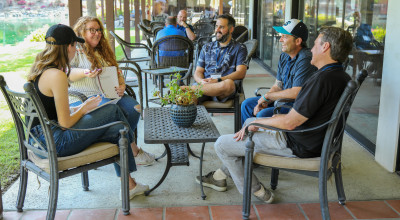Options for Starting Addiction and Mental Health Recovery
January 17th, 2023
By P. Casey Arrillaga, LCSW, LCDC
There are various statistics estimating how many people are addicted or suffer from other mental health issues in our society, but if it’s you or someone you love, all you need to know it that it is one too many. Most people who become addicted want to stop at some point, and those who struggle with mental health issues almost universally want to feel better. When someone is ready to get help, it can be a game-changer to already know what options exist.
As it turns out, there are many paths available covering a wide range of life circumstances, and navigating these options to find the right one for you or a family member can be daunting. That’s why it’s helpful to know what is available, get a general idea of what each option looks like, and learn how to find it. This post will give you an overview of all of these things. Some of the options will apply more for addiction and some more for mental health, but there is a lot of overlap. We’ll cover trying to get better on your own, family support, individual therapy, recovery meetings, outpatient treatment, residential treatment, detox for addiction, and inpatient stays for mental health.
Trying to get better on your own is usually the first option that people try. When struggling with mental health, this could look like reading self-help books and trying the suggestions or using affirmations. It often also involves more self-destructive ideas like abusing alcohol or other drugs, which is why so many people with mental health issues develop addictions over time. Trying to stop on your own is also most people’s first choice when suffering from addiction. This may or may not involve telling anyone else. It could be as simple as saying, “I’m going to cut back/stop tomorrow,” or, “I’m going to take the next month as stop drinking to prove that I can.” For most people, the ideas listed above are not enough to stem the tide of mental health or addiction, let alone both at the same time. Some people get better for a while, but the majority will return to their previous symptoms, and a lot of people will get worse from there. After a few times of trying to get better all on their own, many people are ready to see what kind of help is available.
At this point, a lot of people turn to their family for help. In many of these cases, family members are more than willing but may not be well equipped to do so. If you are a family member in this position, it would be very understandable if you want to jump in the middle and save your loved one, but this often does not turn out any better than if you tried to do heart surgery on your loved one. Instead, the most supportive thing you can do is to get them to people who have more experience with tackling addiction and other mental health issues, and then start working on your own recovery from the effects of your loved one’s problems. Two options for this are finding a therapist for yourself who understands these issues, and going to meetings of a family recovery fellowship such as Al-Anon or SMART Recovery Family & Friends around addiction or NAMI and other support groups around mental health. If your loved on is not asking for help yet, get your own support until they are ready to get theirs.
Individual therapy is a popular first option for getting help for addiction and other mental health. It is private and the therapist is bound by law and ethics to keep everything discussed confidential. The most important thing with this option is to make sure the therapist is experienced in dealing with the issues you or a loved one is facing. If you have a heart problem, you see a heart specialist. If you have an addiction problem, you see an addiction specialist. Some online search options such as Psychology Today allow you to filter for therapists who have training and experience helping with the conditions at hand. Therapy can be incredibly helpful in uncovering and working on underlying issues, but seeing someone once a week is often not enough by itself in the daily battle to avoid relapse in to previous thoughts and behaviors. That’s why most addiction therapists recommend also attending recovery meetings. Some therapists also refer people to recovery meetings for mental health, but many don’t know as much about them so may not think to recommend them.
Recovery meetings are the backbone of many people’s recovery from addiction, and many people with other mental health issues find them helpful and even essential. Unlike therapy and other professional services, recovery meetings can be attended for life and are free, so they make an invaluable resource. They provide the general support of knowing you are not alone, a safe place to talk through specific issues, a source of helpful ideas such as the 12 Steps or SMART tools, and a place to get contact information of people who will be willing to help in between meetings. Support groups for addiction include Alcoholics Anonymous, Narcotics Anonymous, and SMART Recovery. For mental health issues, SMART has specialized groups, as does NAMI, and Emotions Anonymous offers support through the 12 Step model.
Outpatient groups, often referred to as “IOP”, offer a higher level of support but are paid services, unlike recovery meetings. Outpatient groups are run by licensed counselors and therapists and, unlike recovery meetings, are set up for the group members to attend for a set amount of time, usually somewhere between 4 and 12 weeks. Group members live at home, or maybe in a sober living or group home, and attend the IOP 3-4 days a week for 3-4 hours. Sessions usually involve a mix of group processing and specialized education. IOP programs are increasingly available online, making them even more convenient. Some people make IOP their first attempt at therapy or treatment, but many use IOP as a transition after residential or inpatient stays when it is clear that getting better at home isn’t going to work out.
As the name suggests, residential treatment involves the person living at the treatment center, which allows more to get done in a shorter amount of time. The days usually involve a full schedule of groups and classes, and there is an overall growth-oriented environment that is an important part of the healing process. Medications and other treatments are usually offered in a way that would not be available in any other setting. While 28 days is the stereotype for residential addiction treatment, research shows that longer stays, such as 60-90 days are much more effective. Look for programs that feature therapists who all have master’s degree or higher education, individualize treatment, work well with mental health as part of the addiction treatment, and are using the latest therapeutic and other helping techniques.
Depending on the severity of the alcohol and other drug use, detox may be needed before other treatment can be started. For people using alcohol and/or benzodiazepines, detox can be the difference between life and death, so it should not be attempted at home unless closely supervised by a medical professional with specialized training. This is why it is usually done at residential treatment centers in-house, making the transition into residential care seamless. Alternatively, it can be done in other medical settings, including inpatient psychiatric facilities or hospitals.
Inpatient psychiatric care is the highest level available, involving lock-down facilities for severe mental health cases, usually people who are in imminent danger of harming themselves or others. In such settings, appropriate medications can be determined and tried quickly. Inpatient mental health stays are usually measured in days rather than weeks, and then the patient is referred to one of the other levels of care covered above.
If you think you or a loved one may be having problems with addiction or other mental health issues, do your research early. It’s hard enough to make decisions about the right options without having to make them in the middle of a full-blown crisis. An Internet search for options accessible to you or that take your insurance doesn’t take long, and the intake specialists at IOP and residential treatment centers are happy to take your call and discuss options. Talking things through with them can be a great first step in gaining more peace of mind.
About The Author
P. Casey Arrillaga is the Team Leader for Education at Windmill Wellness Ranch, and he is the author of books including “Realistic Hope: The Family Survival Guide for Facing Alcoholism and Other Addictions”. His books, podcast, videos, etc. can be found at CaseyAuthor.com


